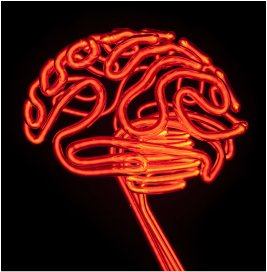|
The brain is there to solve the problems of the body. Especially the gut. If we ingest a toxin (bad food, poison) we need to do something about it right away. The gut might have feelings but it doesn't make executive decisions, that's the brains job. The vagus nerve is an information super highway connecting the brain to every other organ system in the body and it will signal the gastric reflex to vomit. However, if the toxin makes it to the gut we are all familiar with the cramping and hideous feeling of being unwell (in the body and mind) that goes with a dose of gastro. We can't think, act, move, do anything other than be sick. Being sick in the gut dramatically affects the behaviour of the brain.
However, If these cytokines hit a critical amount they can actually cross over into the brain and cause inflammation in the brain! As a result of this brain inflammation there will be a concurrent change in behaviour. It will change the neurotransmitter balance and … "It may be not your head it could be your tummy" (Henry Oselink 1). There is a lot of research coming out about the link between inflammation and psychology. To me as a psychologist its a plain as my own recent experience with a gastro bug. The virus/ bacteria or what ever it was was in my gut as the cramps and frequent trips to the bathroom left no mystery as to the cause of my illness. Yet it was my behavioural output that struck me - they way I felt and acted. Tired, lethargic and unable to do much of anything, nor did I want to, which is most uncharacteristic (much like many of my depressed clients). Then during recovery when some energy was back but the stomach ache was still there I had a day of feeling irrationally cranky and irritable (much like some of my other clients). I knew there was no reason for me to be angry, but everything annoyed me. I appreciate this experience as it gave me first hand experience with puzzling chronic symptoms of some of my clients who often also have gastric symptoms. Its the one who have no clear gastric symptoms yet suffer ongoing depression that research is now looking at and realising that "chronic exposure to elevated inflammatory cytokines and persistent alterations in neurotransmitter systems can lead to neuropsychiatric disorders and depression". 2. I truly believe that if psychology is to move forward as a science we need to stop looking at the head as separate from the body as so many other specialist disciplines do. We are a whole interconnected organism where one organ system can affect another and this needs to be appreciated in the treatment of long standing mood disorders where counselling and medication has failed. REFERENCES
1. Interview Henry Osiecki - BioConcepts "The Gut-Mind Link and how emotional responses can trigger physiological disease states and symptomology ." 2. Neuroscience. 2013 Aug 29;246:199-229. doi: 10.1016/j.neuroscience.2013.04.060. Epub 2013 May 3. Inflammatory cytokines in depression: neurobiological mechanisms and therapeutic implications. Posts regarding integrative medicine, human behaviour, psychotherapy, gestalt therapy, bio-chemical disorders; pyrrole, methylation, copper and zinc imbalances, child behaviour, family relationships, parenting.
0 Comments
Leave a Reply. |
AuthorClarissa Mosley Categories
All
Archives
November 2022
|

 RSS Feed
RSS Feed



